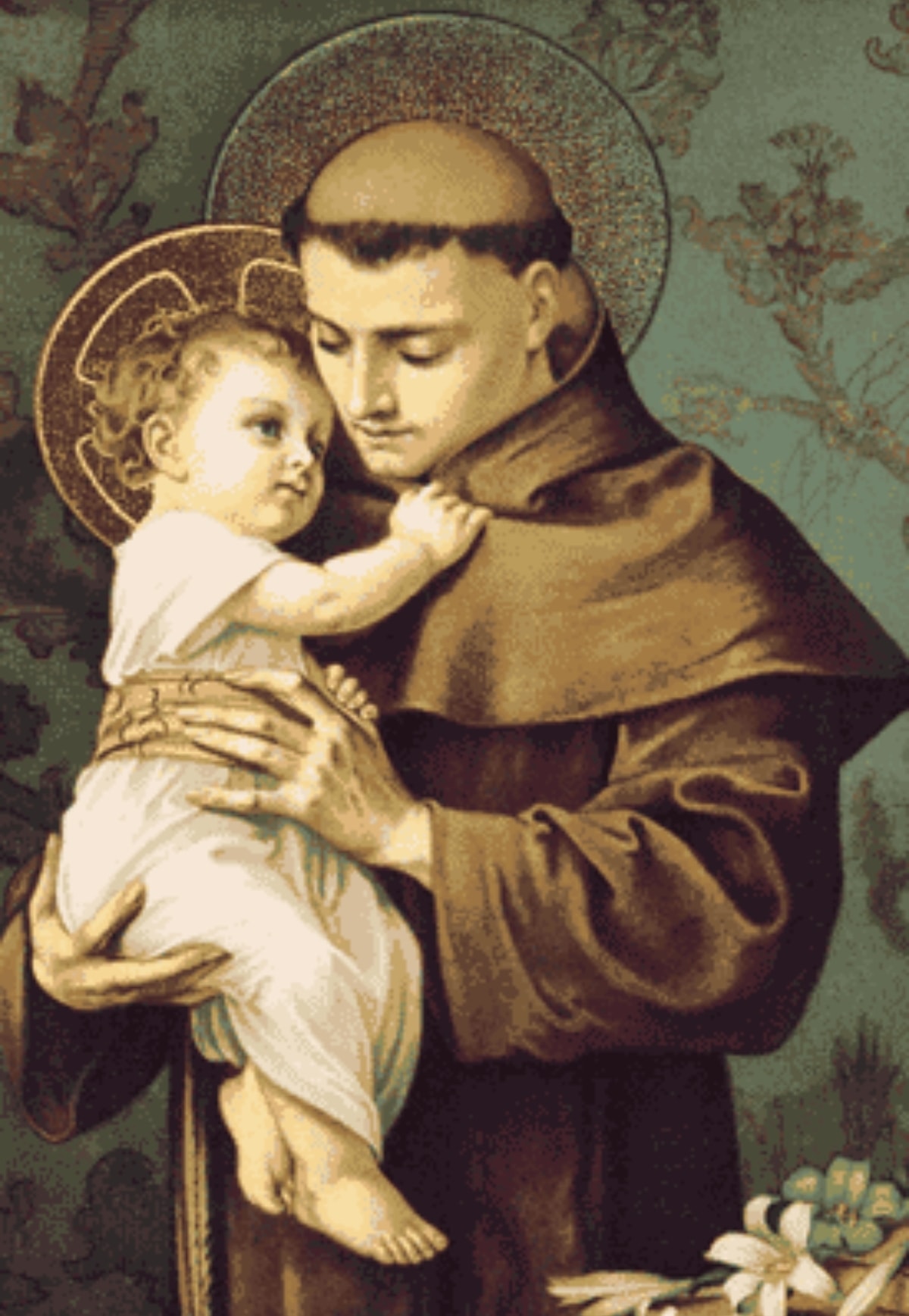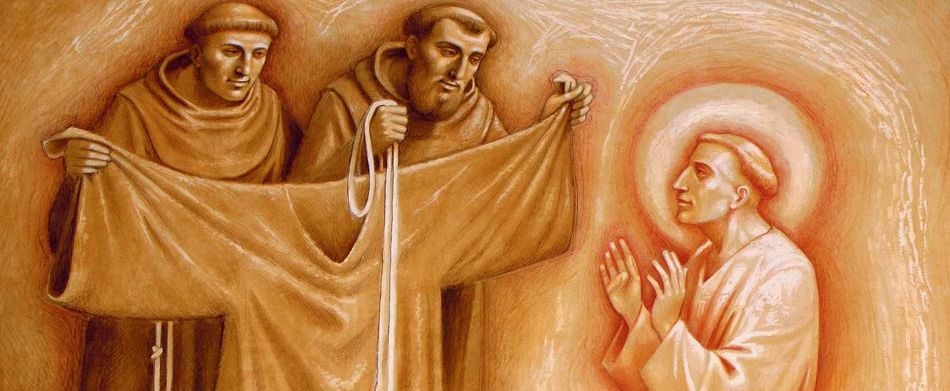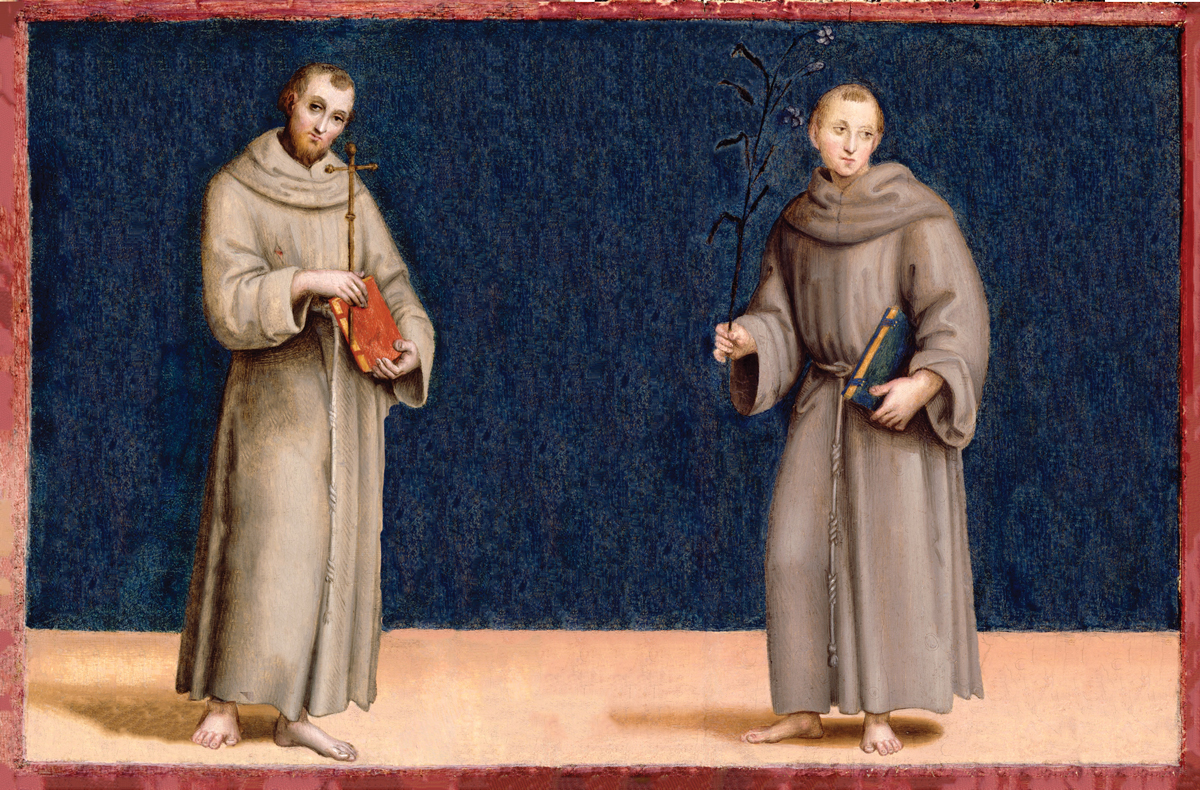
His Life
Born Fernando Martins de Bulhões in 1195 in Lisbon, Portugal, St. Anthony of Padua’s early days were marked by a deep religious fervor and dedication to learning. At a young age, he was drawn to the life of faith and joined the Augustinian Abbey of St. Vincent on the outskirts of Lisbon. However, his quest for a more profound religious experience led him to transfer to the Abbey of Santa Cruz in Coimbra, where he immersed himself in theology and scripture. It was here that Fernando first encountered the Franciscan friars and was inspired by their dedication to poverty, simplicity, and the teachings of Jesus Christ. This encounter set the stage for his eventual decision to join the Franciscan Order, adopting the name Anthony in honor of the great St. Anthony the Great.

St. Anthony of Padua, revered as a powerful intercessor and the patron saint of lost items, is celebrated not only for his profound theological insights but also for the miraculous events attributed to him. His life and teachings have been a source of inspiration and solace for countless believers through the centuries.
Miracles
The Miracle of the Eucharist: One of St. Anthony’s most famous miracles occurred in the town of Toulouse, where he successfully challenged a heretic who denied the presence of Christ in the Eucharist. St. Anthony proposed that a starved donkey would choose the Holy Eucharist over fodder. When the animal, despite its hunger, knelt before the Eucharist instead of eating, the heretic was converted, and the miracle served to deepen the faith of the community in the Real Presence of Christ in the sacrament.
The Speaking Infant: In another remarkable event, it is said that an infant spoke to confirm St. Anthony’s innocence when he was falsely accused of a crime. This miracle not only cleared his name but also underscored his purity and the divine favor he enjoyed.
Miraculous Healings: Throughout his ministry, St. Anthony was attributed with numerous healings. The sick were often restored to health through his prayers, and he was known to have a special gift for healing both spiritual and physical ailments. These healings were a testament to his holiness and his close relationship with God.
Teachings
Humility and Charity: At the core of St. Anthony’s teachings was the emulation of Christ’s humility and unconditional love. He often spoke of the importance of humility, advising his followers to seek not the admiration of others but the quiet recognition of God alone. His sermons and life also underscored the virtue of charity, advocating for generosity towards the needy and compassion for all beings.
Faith and Scripture: St. Anthony had an unparalleled devotion to the Scriptures. He believed in the transformative power of faith and the Word of God, using his deep knowledge of the Bible to convert heretics and deepen the faith of believers. His sermons, rich with scriptural references, emphasized the relevance of the Gospel in everyday life, calling for a lived faith that reflects Christ’s teachings.
Love for Creation: Reflecting the Franciscan tradition, St. Anthony taught love and respect for all of God’s creation. He is often depicted preaching to fish and animals, symbolizing his understanding of the interconnectedness of all life and the responsibility of humans to care for the environment.
St. Anthony’s miracles and teachings continue to resonate with the faithful, offering guidance and hope. His life reminds us of the power of faith, the importance of humility and charity, and the profound impact one can have by living a life devoted to God’s service. Through his intercession, teachings, and the miracles attributed to him, St. Anthony of Padua remains a beacon of light for those seeking spiritual solace and a deeper connection with the divine.

While St. Anthony and St. Francis of Assisi were contemporaries, their interactions were limited; however, the impact they had on each other’s lives and on the Franciscan movement was profound. St. Francis, the founder of the Franciscan Order, was known for his radical embrace of poverty and his love for all of God’s creation. St. Anthony, though he joined the Franciscans later in his life, quickly became one of its most important figures, embodying the Franciscan ideals espoused by St. Francis. The few documented encounters between St. Anthony and St. Francis highlight a mutual respect and shared vision for the Order. St. Francis, recognizing St. Anthony’s scholarly gifts, entrusted him with the task of teaching theology to the Franciscan friars, marking the only time St. Francis allowed a friar to formally teach. This endorsement underscores the complementary nature of their contributions to the Franciscan Order and the broader Church.
St. Anthony of Padua’s final days were marked by illness and a deepening of his spiritual life. In 1231, worn out by his tireless work and extensive travels to preach the Gospel, St. Anthony’s health began to decline. Recognizing the end of his earthly journey was near, he retired to the Poor Clare convent at Padua, Italy, for peace and solitude. Surrounded by his fellow friars and in a state of prayer, St. Anthony died on June 13, 1231, at the young age of 36. His death was mourned across Europe, and he was canonized as a saint by Pope Gregory IX less than a year later, in 1232, in recognition of his miraculous healings and the profound impact of his ministry.

The legacy of St. Anthony of Padua endures through his widespread veneration as a saint of the Catholic Church and the lasting impact of his teachings and works. Renowned for his powerful preaching, deep knowledge of scripture, and unwavering devotion to the poor and suffering, St. Anthony’s life exemplifies the Franciscan ideals of humility, charity, and faith in God. His feast day, celebrated on June 13th, is a time of reflection and prayer, reminding us of the transformative power of living a life dedicated to faith and service to others. Churches and shrines dedicated to St. Anthony around the world serve as centers of worship and pilgrimage, where faithful devotees seek his intercession and guidance. St. Anthony’s legacy is a testament to his role as a beacon of hope and a source of comfort and inspiration for generations of believers.
Recommended Further Reading On St. Anthony of Padua

The Life and Prayers of Saint Anthony of Padua
By Wyatt North
One part biography, one part prayer book, The Life and Prayers of Saint Anthony of Padua is an essential book for any Christian. We hope that with this book, the reader might realize an invitation to call upon Anthony, not just to find lost things, but as a companion in a quest to find a renewed and challenged faith, hope, and love.

St. Anthony of Padua: His Life, Legends and Devotion
By Jack Witnz, OFM
In this expanded edition of a perennial favorite, you will learn even more about the beloved saint’s life in Italy and Portugal as well as where the saint hid to pray—interesting details culled from Friar Jack Wintz’s recent pilgrimages to the sites where Anthony walked, ministered, preached, and prayed.
St. Anthony of Padua provides a from-the-heart look at the saint’s life, the legends surrounding him, and the prayers and devotions to him. You will connect anew to this follower of St. Francis of Assisi with this useful and inspiring guide.

